Follow me as I study the integration of refugees into the National Education System in Kampala, Uganda for my Senior Thesis at Princeton. Be here for the learnings, the stories, and new experiences.
Don't wanna be here? Send us removal request.
Text
Playing Catch Up (Days 4-13)
Time has passed so quickly. It has been almost two weeks since I first arrived. I started this blog when I had a lot of free time waiting for approval, but that free time has dissipated quickly. It’s Sunday and my first free day in a while so I am going to quickly catch up! This is what I’ve been up to from August 16-24th.
Day 4: KCCA Approval and Finding A Partner
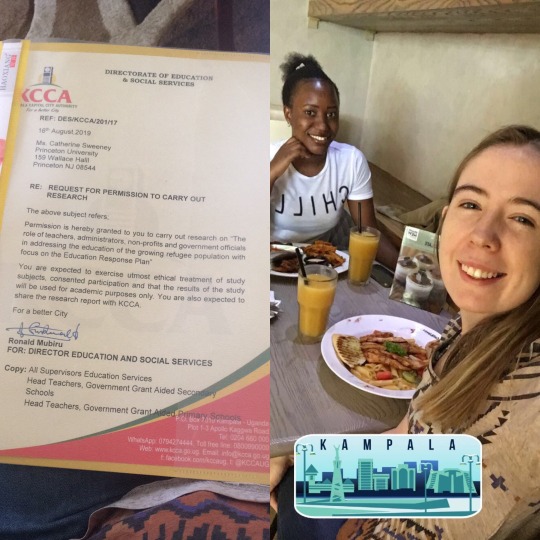
The biggest news from Friday was that I got approval to interview teachers in schools! It must have been the fastest ever turnaround from a government agency.
I also met up with a friend and former colleague from the Bayimba Cultural Foundation, Christine. She just graduated from university and is living at home as she applies for jobs. For context, getting job placements is incredibly hard out of university. Uganda has one of the highest youth unemployment rates in the world.
Given that she had a bit of free time while she is applying, I asked if she would be willing to visit the schools with me, help translate, and take notes. She agreed on the spot and we began planning for the busy week ahead!
After all those major developments, my friend Ryan and I went to a play about the Rwandan Genocide called Red Hills. It was written by a Ugandan playwright and premiered at a New York festival receiving amazing reviews. After her succcess, the playwright founded a theater program here in Kampala.
More details here: https://www.nytimes.com/2018/06/13/theater/red-hills-review.html .
Days 5 & 6: Rotaract Weekend
Last weekend, I was invited to join the Rotaract of Bukoto in Kampala for their annual retreat. Together, we played games like Charades, danced to music and ate some awesome food. We were hosted by a retired parliament member who is in the Rotary Club. They were incredibly welcoming and helpful. As I told people about my project, some even offered to use their connections in the ministry to help me get interviews with policymakers. Below are some highlights of the event!
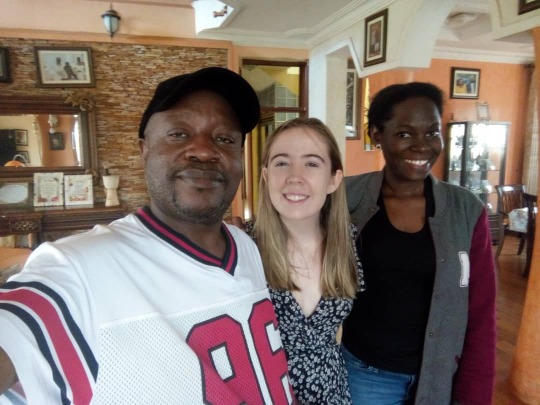
When I arrived home on Sunday, I met up with another Princeton Student and we went to the Bahai Temple to layout on the grass and chill. After that, we went to Prunes, an outdoor café, in Kololo for dinner and to Georgina Gardens Hotel, this beautiful bar on top of a hill from where you can see the entire city.
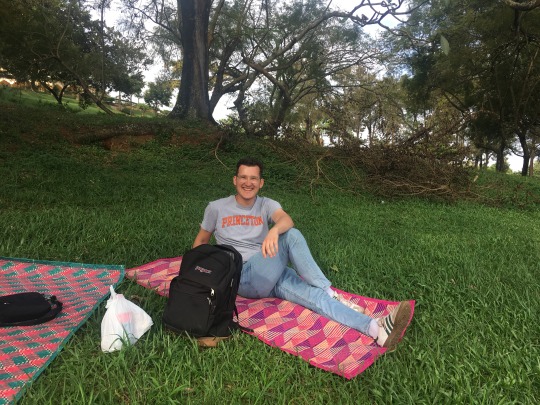
Days 7-11 (August 19- 23): In the Field
Since schools closed on Friday, I was pressed for time to get teacher interviews. Armed with my list of 20 schools, I attempted to go to as many as possible.
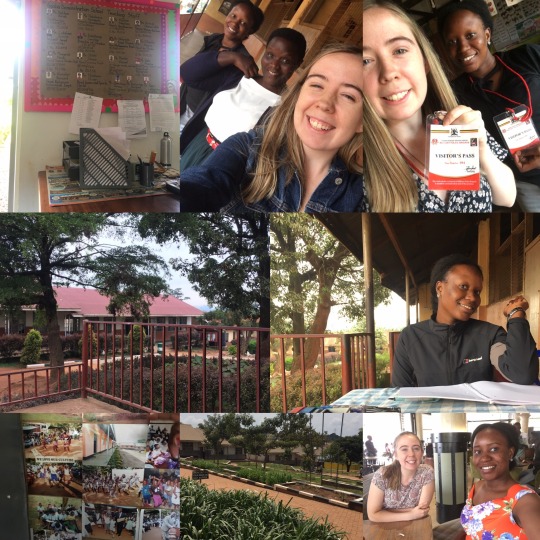
Here are some highlights from the week interviewing:
Meeting Best: Best is a science teacher, who works closely with the refugee population at her school. She told us that she has helped her students integrate by becoming their friends, giving them responsibilities, and teaching remedial classes in the evenings on her own time. She advised other teachers working with these children to give them guidance and create a comfortable environment, so they feel at home. Above all, she said that you need to show these children love and be compassionate. She does this by speaking with them often to improve communications, building relationships with their families, and making herself a trustworthy person that these kids can rely on.
How Basic Necessities Impact Learning: The teachers we spoke to were not only concerned with student performance and behavior. They were very worried about how many of their students lack basic necessities. Through the lens of child studies, teachers spoke of students from broken homes who have very little parental support or guidance. For example, when a child comes to school hungry or unclean, it impacts their ability to focus and succeed at school. With regards to refugee children, there were a few major cases that teachers spoke about. First, some children do not eat the food provided by the school because it is different from what they ate in their home countries. Second, since the refugee students are often much older than their national peers (ex. 15-year-olds in third grade), they sometimes do not fit in the uniforms provided by the school or feel embarrassed to wear them. Teachers told us that this impacts their focus and their feelings of belonging at the school. Lastly, when female students lack sanitary napkins during their menstruation periods, they have to miss school to avoid being improper. Missing a week of learning can be detrimental to a child’s learning development and schools often lack sanitary napkins that they can provide to the children in emergencies.
Peer to Peer Mentorship Club: To help students adjust to the new school, one teacher founded a mentorship club co-chaired by one National student and one International Student. When new refugee children arrive at the school, they are introduced to the mentorship club which aids their transition. In their meetings, they work on demystifying their cultural differences, improving English Language skills, and building a bridge of understanding.
Entering Military Police Barracks: One of the schools we visited was located in the military barracks so we had to go through high security and be escorted to the premises. It was intimidating and a bit nerve-wracking, but it was an exciting experience I never thought I would have.
Peer to Peer Learning and Behavioral Management: Given that most teachers do not speak the major languages of the refugee population, French, Swahili, and Arabic, they often rely on peer to peer learning to teach students with a language barrier. They select refugee students who have adapted to the language and excelled academically, to help the new arrivals learn. Additionally, schools use peer to peer methods to help manage the behavior of new students who might be aggressive or quiet due to not understanding the language. One school we talked created a formalized refugee disciplinary committee where the refugee students react to and guide other refugee students who misbehave
Student Responsibility: Many of these students are much older than the regular primary school age. For example, in many schools, refugees as old as 15 years, will join a first-grade class to develop English Skills. Since this is such a substantial difference, teachers in many schools give the older children a special responsibility to make them feel comfortable and a part of the school population.
Role of the KCCA/Ministry of Education: The Kampala Capital City Authority which sits under the authority of the Ministry, supervises schools and provides teacher resources. They pay salaries to teachers, they provide some funding to schools, and they observe teachers to maintain the standard of education. They also act as the funnel through which all NGOs must go through to get to the schools.
How NGOs Bridge Resource Gaps: The local government, the KCCA, often lacks ample resources to fund school infrastructure improvements, scholastic materials, and workshops. However, education in Kampala is not free, not even for government schools. Students have to pay school fees every term to attend every term. When a school’s needs, extend beyond the capacity of the KCCA, the KCCA directs NGOs to assist. Over this week, we have heard learned about over 10 NGOs that provide infrastructure improvements like building classrooms and toilets, scholastic materials, school fees for children, and workshops and resources for teachers dealing with vulnerable populations. Some of the NGOs are directed by the KCCA to work with specific schools, while others connect to schools through resourceful headteachers who recruit organizations to help with their schools.
Over these past 5 days, Christine and I conducted 31 interviews across 15 schools in Kampala. It was crazy, but a very successful week. We filled 2 full notebooks with jottings and recorded about 24 hours of interviews. On Friday, after the school closed, Christine and I also picked up a beautiful dress from the Downtown shops. They are a bit hectic, but we found the perfect thing to wear for a wedding the next day.
In my free time, I worked more on the interviews at the coworking space, went out to hear live music and eat with friends, and slept a lot!
Days 12-13 (August 24-25): The Weekend
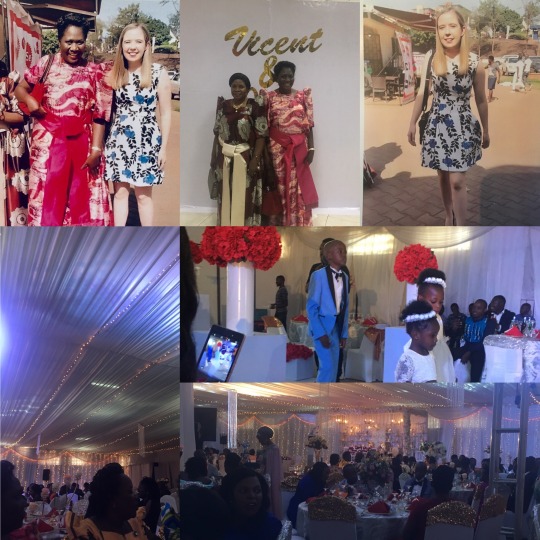
On Saturday, I watched quite a bit of Netflix in the morning because I was feeling a bit ill. I took some medicine and I started a Netflix series called Shadow Hunters based on a book that I read when I was in High School. It is mindless and cheesy at times, but it was the perfect thing to watch after a busy week.
Around midday, Ruth and I got ready to go to a family wedding. I wore the dress I had bought the day before and she wore a bright pink traditional gomesi.
When we arrived at the wedding reception, I was overwhelmed by the grand décor. There must have been over 400 guests. I will show some pictures below! They had a beautiful stage for the head table and a long runway for the bridal party entrance and for traditional dances. They also displayed the pictures from the wedding earlier that day on the media screens. While I didn’t understand the speeches since most were in Luganda, their expressions of happiness were universally understood.

Today, Sunday, I started the day by attending the Rotary Cancer Run- a grand event with 5, 10, and 20 K races and many attractions for the runners. I was invited by my friends from the retreat last weekend. We danced, we ate, and we enjoyed.
Since then, I have just been hanging out, reviewing my field notes, and writing this post.
0 notes
Text
Starting Out: First days are universally the hardest days...
Day 1: August 13, 2019

I arrived in Uganda around 2:30 PM. It was a long journey (12 hours from New York to Dubai and then another 6 hours from Dubai to Entebbe), but we made it safely. Along the way, I watched movies, journaled, and began to read Melinda Gate’s book, The Moment of Lift.
I was greeted at the airport by Ruth, my host, and her cousin George, who I met on my last trip. After about 20 hours of traveling, I felt extremely comforted by a familiar face. We hopped in the car and made our way back to Kampala.
When we made it to Ruth’s house, it felt entirely different than last time. Everything might have looked the same or similar to what it was a year ago. However, during my last trip, I always had Ysabel, a fellow student, by my side experiencing everything. We had been chosen to work the internship together, live together, and be support sources for each other.
This time, I am on own, and being back in Ruth’s house without Ysabel made me confront that reality. Not only am I on my own, but I am also doing a completely independent project. There is no office space for me to go, no strict 9-5 schedule, and no manager assigning my tasks. I am in charge of finding a space to work, creating structure for myself, and finding people to interview.
I tried to fall asleep around 8:00 PM, but I could not help but feel a little overwhelmed by this reality. “What was I doing here?”, I thought. Doubts, worries, and stressors circled my mind and kept me up. This is often what happens to me when I have to deal with uncertainty. My mind thinks of all the things that could go wrong rather than the plan to make it go right. However, I decided to shut that shit down and play a guided meditation for sleep. Sometimes, when confronted with anxiety, this is the best way for me to get through it. The guided meditation urges you to “give your thoughts permission to leave you to take their own journeys for a while and join you again in the morning”. While this seems like the obvious thing to do after a long journey with limited sleep, sometimes it is helpful to have a reminder to tackle your problems when you are well rested.
I woke up again around 1:00 AM and luckily Maddy, a good friend, was around to call and chat. She heard me out, made me feel comforted, and reminded me that I am up for task. Feeling more secure, I fell back asleep and let my mind and body prepare for the next day ahead.
Day 2: August 15th, 2019

Given my anxieties the night before, I really hit the ground running on my second day. I got up and called a friend around 8:00 AM, I ate a breakfast consisting of mango, pineapple, and a fried egg, and then I took a boda to Acacia Mall to get started.
I first tackled the problem of getting an office space. I visited a local coworking space called Tribe Kampala, where many researchers and internationals come to enjoy fast internet and a productive environment. I opened a membership, set up my WiFi, and sat down to work.
Next, I started to make a real tangible action plan. For my senior thesis, I am investigating the roles and experiences of teachers, administrators, policy makers, and nonprofits in integrating the refugee population into the national education through the Education Response Plan (ERP). I intend to start with the schools because they are hardest to reach from abroad and Ruth, my host mom, offered to drive me to these schools because she does not have much going on during the weeks.
While I had prepared a list of schools that I was interested in visiting before coming, I realized that I had to narrow down my target sample to schools that serve refugees. I had read in numerous reports that mentioned 23 schools with the highest refugee populations, but I was having trouble tracking their names.
I first attempted to narrow the sample down by identifying the subdistricts in Kampala with the highest refugee populations and creating a list of schools within those areas. Then, after four hours of work, by the grace of God, I found a list of schools in Kampala and their refugee count in their student population deep in the bottom of a UNHCR update from 2016. While collecting accurate information of the refugee status of students can be difficult because many children choose not to disclose this information, this was a start. With this list, I began mapping out the schools, tracking down their phone numbers, and creating a plan to visit them starting next week.
After working for quite some time, I headed over to Acacia Mall to buy a phone plan. Unfortunately, I forgot that I needed my passport to register so I had to put this task off for the next day. Instead of doing that task, I went to a café, had a passion juice, and practiced on my mental math to prepare for some case interviews that are looming in the fall.
Around dinner time, I met up with Ryan, a recent Princeton graduate currently doing a Princeton in Africa Fellowship which sets you up to work for NGO or Social Enterprise in Africa for a Year. He is working for Rockies, an organization that scouts a talent from across rural Uganda, recruits them for a performance troop, and pays for their training and schooling. He just moved here in the beginning of August and is already being thrown into work from grant writing to logistics.
We went to Meza, my favorite shawarma place in the world, and chatted about our experiences, our transition, and our lives. Then, we went to Wine Garage, a nearby lowkey wine bar, for their happy hour to celebrate meeting each other and my first full day in Kampala.
I ended the day feeling more confident and positive then before. I realized I wasn’t alone and that I had many contacts and many people I could reach out to. I also realized that I can make a plan and execute on it- it’s as simple as just doing it. I had plan to contact schools the next day and reach out more people.
This time when I got home, I worked a bit more, excitedly showed Ruth the schools, and called my parents and friends to tell them the updates. Things were looking up!
Day 3: August 15th, 2019

Today, was a longer day. I woke up a bit later around 9 AM because I was up until late working on logistics for when I get back to school and start working with the Glee Club. I quickly showered, ate breakfast, and ran out the door.
I made it to Acacia Mall around 10 AM and went to the MTN Mobile Provider Office to set up my local number (finally!) Pro Tip: Always do it at the airport- it might be more expensive, but it’s easier. It took about an hour to get all set up and squared away with a phone number, but I practiced on my mental math app in the meantime. While I wanted to have been watching Stranger Things, the last thing I need right now is more mysteriousness to creep into my subconsciousness. So, instead of watching those pre-downloaded Netflix episodes, mental math it was.
After, I finished setting up my phone. I went to Tribe Kampala and began to make phone calls. The first 10 schools I called either did not pick up or were invalid numbers. Finally, 11 calls later, an administrator told me that I must go through the Kampala Capital City Authority (KCCA) to interview students (yay bureaucracy!!).
With this new development, I called the KCCA to figure out the process to get their approval and introduction to schools. I found out I needed to provide a letter of introduction from my University providing the details of my work. So, for the next hour, I printed and assembled a packet to bring to the KCCA. I then took a safe boda to the KCCA, walked into their massive complex, and was directed to the department of education for approval. I handed her the packet, explained my time crunch (only 3.5 weeks), and she told me that I can expect to hear back from tomorrow with her feedback (Please say a prayer for this to work out). Despite this bureaucratic bump in the road, I am positive that it will all work out and that I am taking the steps in the right direction.
After this, I had a call with an associate at a consulting firm to learn about her experience and gather her advice. I also read a chapter in my Casebook and practiced more mental math (shout out to my sister if she’s reading this).
For dinner, I met up with Rosette, a former coworker of mine from the Bayimba Cultural Foundation, where I worked last summer. She has since left the organization and is on her way to the next thing in life. Here is a bit about her life because I think she is a power house and we all can learn from the way she walks purposefully through life and always demonstrates her value:
She is the daughter of a diplomat, who recently passed away, and majored in tourism in her undergraduate education. She had always been interested in theater and drama starting with her work at her local parish where she led the Christmas Cantatas and taught Sunday School through drama. While working at Sunday School, a leader in the church took notice and offered her a job as her project manager. She worked there for a while, but after being dissatisfied with inconsistent pay, she looked to move on.
It was around then when she made a close connection with the woman who would always write the Christmas Cantatas. She impressed the woman by tidying up her place and offered Rosette an administrator job. While she was happy at this job, she both lived and worked with this woman which made for difficult boundaries. It was around that time when she started going to the Bayimba Festival and connecting with their founder, Faisal. She became their part-time workshop coordinator as she continued working for the other woman often working early mornings, late nights, and traveling on the weekends for the Bayimba events across the country. After doing this for a period of a year, she realized that she had to get out and move on her own. Around that time, she met three international women hoping to rent out their place while they would be away. Despite not having the money at the time, she demonstrated her interested and moved forward with the opportunity.
After working hard at Bayimba, the team there began to take notice and offered her a full-time position when the funding came in. She then was able to move out of the old job and house and start this new career with Bayimba. For the past 9 years, that had been her life. She worked as the coordinator for the Bayimba Academy- organizing workshops, inviting guest artists from around the world, and helping develop the young talent here in Uganda.
Just this May, she resigned from Bayimba and began to take the steps towards her next phase in life. She is hoping to improve her education and eventually work to improve the channels for cultural exchange across the world and open people’s minds up to the broad arts landscape that is out there. She is brilliant, strategic, and has had so much faith and courage over her life. I am excited for her next adventure.
Rosette and I talked for hours and she connected me with some music educators that serve refugee populations across Uganda who I will try to interview. She is one of those amazing individuals that leave you speechless at times.
Now, I am in my room in bed at Ruth’s house next to the Oryx Petrol Station on Bukoto-Kisassi Road. I am exhausted, but so excited and ready for what will come tomorrow.
1 note
·
View note